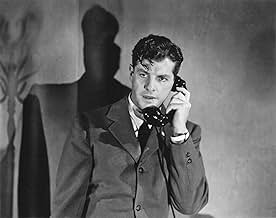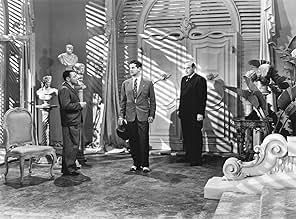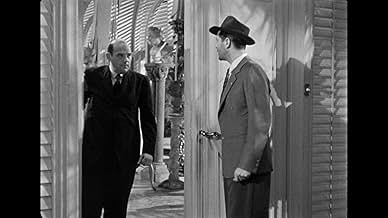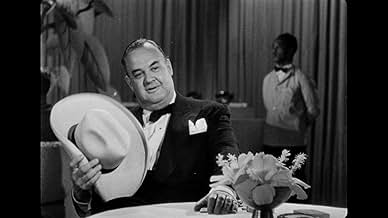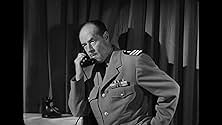NOTE IMDb
6,4/10
3 k
MA NOTE
Ajouter une intrigue dans votre langueChuck Scott gets a job as chauffeur to tough guy Eddie Roman; but Chuck's involvement with Eddie's fearful wife becomes a nightmare.Chuck Scott gets a job as chauffeur to tough guy Eddie Roman; but Chuck's involvement with Eddie's fearful wife becomes a nightmare.Chuck Scott gets a job as chauffeur to tough guy Eddie Roman; but Chuck's involvement with Eddie's fearful wife becomes a nightmare.
- Réalisation
- Scénario
- Casting principal
- Récompenses
- 1 nomination au total
Michèle Morgan
- Lorna Roman
- (as Michele Morgan)
Nina Koshetz
- Madame Chin
- (as Nina Koschetz)
Florence Auer
- Miss Connors
- (non crédité)
Spencer Chan
- Customer Patron
- (non crédité)
Herbert Evans
- Havana Cafe Customer
- (non crédité)
Tom Ferrandini
- Nightclub Patron
- (non crédité)
Bess Flowers
- Nightclub Patron
- (non crédité)
Avis à la une
This is one of the most off-beat noirs you will ever see.It ranges from tension to turmoil in short bursts because it is, ah, different.You may have to run parts of it back to see if you missed something - but chances are you didn't. It's that kind of film.
The heavies are the best part of the cast. Steve Cochran may have done his best work here, and Peter Lorre does what he does best.Michele Morgan is lovely, and Bob Cummings seems as confused as the rest of us. I enjoy plot twists to a point, but the whole picture is a plot twist.
You may have to struggle with the continuity and the sound track, as the film was assembled piecemeal and the restoration is not as good as could be hoped. Against my better judgment I gave this a 7, although on balance it's not that good; it's just so - how should we say - bizarre.
The heavies are the best part of the cast. Steve Cochran may have done his best work here, and Peter Lorre does what he does best.Michele Morgan is lovely, and Bob Cummings seems as confused as the rest of us. I enjoy plot twists to a point, but the whole picture is a plot twist.
You may have to struggle with the continuity and the sound track, as the film was assembled piecemeal and the restoration is not as good as could be hoped. Against my better judgment I gave this a 7, although on balance it's not that good; it's just so - how should we say - bizarre.
As a director Arthur Ripley only made six feature films but nothing in that short career quite prepares you for the gem that was "The Chase", which he made in 1946 and which Philip Yordan adapted from a Cornell Woolrich story. It's certainly bizarre, as down-on-his-luck Robert Cummings, (why Robert Cummings I keep asking myself), finds a wallet belonging to gangster Steve Cochran who, when he returns it, hires him as a chauffeur and that's when his troubles really begin, particularly when Cochran's frightened wife, Michele Morgan, asks him to help her get away from her husband.
Everything about this film is surprising and I just don't mean the plot. Cochran's a thug but he lives in a kitsch mansion filled with marble statues and he likes to listen to classical music while Cumming's a veteran who is also a dab hand on the piano. Perhaps the biggest surprise is just how good both these actors are. Being a gangster Cochran naturally has to have a henchman and as always Peter Lorre is superb in the part. About midway through you might start to get an idea in which direction this very strange movie is going and you may even be right...but on the other hand. Needless to say, "The Chase" has all but disappeared but if any film deserves cult status this is it. Unmissable.
Everything about this film is surprising and I just don't mean the plot. Cochran's a thug but he lives in a kitsch mansion filled with marble statues and he likes to listen to classical music while Cumming's a veteran who is also a dab hand on the piano. Perhaps the biggest surprise is just how good both these actors are. Being a gangster Cochran naturally has to have a henchman and as always Peter Lorre is superb in the part. About midway through you might start to get an idea in which direction this very strange movie is going and you may even be right...but on the other hand. Needless to say, "The Chase" has all but disappeared but if any film deserves cult status this is it. Unmissable.
I like the film - it builds suspense. It might not be the best dramatic film noir on the market, but it's not a bad one. I've seen far worse films that are put in the film noir category. The Chase is standard crime stuff but has a charm and story of it's own.
Chuck Scott is an a war vet and an honest man. He returned a wallet to a man that lost it - impressed, the man hires Chuck as his chauffeur. Over a little bit of time, the man's wife talks Chuck into taking her away from her abusive husband and when the husband finds out he goes after them. It is dreamy as Chuck Scott is on the run and really unsure if his mind has become "unhinged" as his doctor put it. Chuck Scott was a war vet and his doctor seems to feel he is a clear case of PTSD. How much of this is a dream, how much is real, is it all a dream or did it really happen?
I didn't have a problem with the pacing of this film - seemed fine to me.
7/10
Chuck Scott is an a war vet and an honest man. He returned a wallet to a man that lost it - impressed, the man hires Chuck as his chauffeur. Over a little bit of time, the man's wife talks Chuck into taking her away from her abusive husband and when the husband finds out he goes after them. It is dreamy as Chuck Scott is on the run and really unsure if his mind has become "unhinged" as his doctor put it. Chuck Scott was a war vet and his doctor seems to feel he is a clear case of PTSD. How much of this is a dream, how much is real, is it all a dream or did it really happen?
I didn't have a problem with the pacing of this film - seemed fine to me.
7/10
Great cinematography. Excellent acting. Taut direction. But the plot is bizarre. Everything rolls along nicely until suddenly -- without any warning -- the plot morphs into something else. Same characters and location but completely different storyline. Weird and confusing as people who were killed in the previous section show up alive again...
Nevertheless, the movie contains some terrific villains. Steve Cochran delivers a mesmerizing performance as a sadistic mobster and Peter Lorre is in top form as his cold-blooded, sinister sidekick. Michele Morgan is an edgy femme fatale and Bob Cummings delivers a convincing performance as the troubled hero.
The cinematography is classic noir with beautifully composed shots in dark settings full of intrigue and menace. A particularly memorable scene is where the cops burst into a room in search of Cummings only to find a woman sobbing uncontrollably at a table. There is some sharp dialog and lush romantic music although the sound track is scratchy. The movie is flawed by the fractured plot but worth adding to your collection.
Nevertheless, the movie contains some terrific villains. Steve Cochran delivers a mesmerizing performance as a sadistic mobster and Peter Lorre is in top form as his cold-blooded, sinister sidekick. Michele Morgan is an edgy femme fatale and Bob Cummings delivers a convincing performance as the troubled hero.
The cinematography is classic noir with beautifully composed shots in dark settings full of intrigue and menace. A particularly memorable scene is where the cops burst into a room in search of Cummings only to find a woman sobbing uncontrollably at a table. There is some sharp dialog and lush romantic music although the sound track is scratchy. The movie is flawed by the fractured plot but worth adding to your collection.
A troubled ex-serviceman gets a job with a crime boss and his disturbed wife.
A 'find' for me and perhaps for other fans of noir. The 80-minutes are a perfect blend of dark visuals and surreal story. Frankly, when I think noir, I don't think Bob Cummings, an excellent light comedy actor, but hardly a figure of depth. But here, he essays the role of the troubled vet in subtle and persuasive ways. The nightclub scenes in Havana are particularly revealing, as the chaotic gaiety swirls around Scott (Cummings) and his spacey lover Lorna (Morgan)—a perfect metaphor for their circumstance.
A number of touches make this a memorable film. Casting Lorre as Gino was a coup, since his quietly devilish imp casts a background shadow over the proceedings. That's significant because Cochran, the alleged crime boss, comes across as a rather charming fellow even if he's behind dark deeds. Then there's that scene in the wine cellar, unlike any I've seen, and shrewdly abbreviated to catch the imagination. Also, catch Lorna's cameo framing through the porthole with shadows rising and falling over her face, as her nature itself migrates between light and dark. Add to the mix a speeding locomotive as the hand of fate, and a weirdly backseat driver that really is a backseat driver, and you've got an appropriately noirish race against time. And, of course, mustn't leave out the final scene so perfectly calibrated to end the film on a provocatively surreal note.
The movie's full of such imaginative twists and turns as penned by two of the best in the business, Woolrich and Yordan. I'm not sure why the movie's generally overlooked in the noir canon, perhaps because of Bob Cummings and his lightweight reputation, plus the lack of a true spider woman. Nonetheless, it's a provocative little gem, and one that prompts rare second thoughts long after the screen has gone dark.
A 'find' for me and perhaps for other fans of noir. The 80-minutes are a perfect blend of dark visuals and surreal story. Frankly, when I think noir, I don't think Bob Cummings, an excellent light comedy actor, but hardly a figure of depth. But here, he essays the role of the troubled vet in subtle and persuasive ways. The nightclub scenes in Havana are particularly revealing, as the chaotic gaiety swirls around Scott (Cummings) and his spacey lover Lorna (Morgan)—a perfect metaphor for their circumstance.
A number of touches make this a memorable film. Casting Lorre as Gino was a coup, since his quietly devilish imp casts a background shadow over the proceedings. That's significant because Cochran, the alleged crime boss, comes across as a rather charming fellow even if he's behind dark deeds. Then there's that scene in the wine cellar, unlike any I've seen, and shrewdly abbreviated to catch the imagination. Also, catch Lorna's cameo framing through the porthole with shadows rising and falling over her face, as her nature itself migrates between light and dark. Add to the mix a speeding locomotive as the hand of fate, and a weirdly backseat driver that really is a backseat driver, and you've got an appropriately noirish race against time. And, of course, mustn't leave out the final scene so perfectly calibrated to end the film on a provocatively surreal note.
The movie's full of such imaginative twists and turns as penned by two of the best in the business, Woolrich and Yordan. I'm not sure why the movie's generally overlooked in the noir canon, perhaps because of Bob Cummings and his lightweight reputation, plus the lack of a true spider woman. Nonetheless, it's a provocative little gem, and one that prompts rare second thoughts long after the screen has gone dark.
Le saviez-vous
- AnecdotesUnderwent a restoration in 2012 by the UCLA Film & Television Archive.
- GaffesThe car speeds towards the oncoming train at 110 mph. The car's brakes are slammed on when it's about 30 feet from the track and then it skids to a stop within one or two car lengths. Defies physical law.
- Citations
Eddie Roman: [after getting his lost wallet returned] How do you like that for an honest guy!
Gino: I don't... Silly, law-abiding jerk.
- Crédits fousSteve Cochran (courtesy of Samuel Goldwyn)
- Versions alternativesThere is an Italian edition of this film on DVD, distributed by DNA srl, "SABBIE MOBILI (1950) + THE CHASE (Incatenata, 1946)" (2 Films on a single DVD), re-edited with the contribution of film historian Riccardo Cusin. This version is also available for streaming on some platforms.
- ConnexionsEdited into Terror in the Pharaoh's Tomb (2007)
Meilleurs choix
Connectez-vous pour évaluer et suivre la liste de favoris afin de recevoir des recommandations personnalisées
- How long is The Chase?Alimenté par Alexa
Détails
- Durée
- 1h 26min(86 min)
- Couleur
- Rapport de forme
- 1.37 : 1
Contribuer à cette page
Suggérer une modification ou ajouter du contenu manquant


